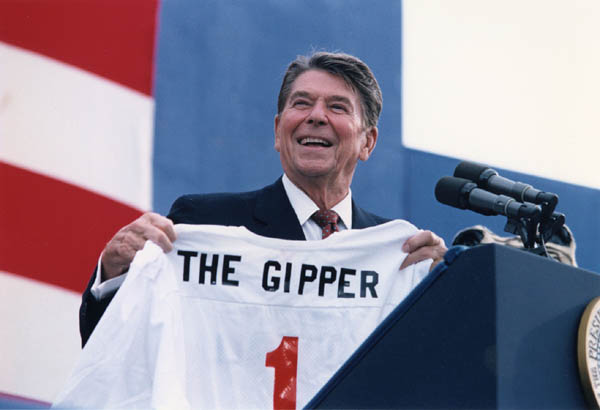What Would Reagan Do: How a Conservative Became the Democrats’ Hero

On two separate occasions last week Democrats invoked the words of Reagan stressing the importance of raising the debt ceiling as part of a plea to intransigent Republicans. First came a video compilation of audio clips of Ronald Reagan excoriating Republicans for being out of touch with reality in the debt ceiling negotiations. In one particular 1987 radio broadcast, then President Reagan blamed Congress for pushing the United States “to the edge of default before facing its responsibility.” And later on in the week came a letter, released by the Congressional Progressive Caucus, which Reagan wrote to Senate Majority Leader Howard Baker in which he pleaded with him to abstain from debt ceiling brinksmanship, explaining:
“This country now possesses the strongest credit in the world. The full consequences of a default —or even the prospect of default — by the United States are impossible to predict and awesome to contemplate.”
President Obama has also done his best to invoke the words and spirit of our legendary 40th president in the hopes of currying favor and finding common ground with centrists and Republicans. Like his Democratic predecessor, Obama has offered various milder iterations of the fact that the era of big government has ended, stating in an address to the nation earlier this month:
“Government has to start living within its means, just like families do. We have to cut the spending we can’t afford so we can put the economy on sounder footing, and give our businesses the confidence they need to grow and create jobs.”
This is a statement from a man who, at the time of his election, was considered to be the liberal answer, or even antidote to the Age of Reagan; yet such rhetoric seems almost identical to that of the former president who beseeched all Americans to sacrifice their fair share during equally arduous economic times. However this Democratic adoption of the wisdom of Reagan was not something spurred by the ongoing political stalemate, but rather has been part of a gradual rightward progression in American political thought.
What seemed to have started in the Clinton administration as a turn towards centrism and moderation has morphed into an acceptance of conservative dogma as political and policy reality. With Bill Clinton’s presidency in 1992, it seemed that Democrats had finally managed to overcome Republican dominance. The road back to power though was a tough one and featured one major casualty: the legacy of prevailing Democratic titan FDR and has New Deal policies. The Great Communicator had spoken and diagnosed government as the malaise plaguing our nation, “Government is not a solution to our problem, government is the problem.” And with that mantra in mind, Democrats resolved to no longer utilize government as a primary mechanism for overseeing the well-being of the people. Which is why former president Clinton worked with Republicans on dismantling the welfare system and easing, or outright removing, major regulations within the financial sector.
For a while this move towards the center worked: the budget was balanced and Democrats successfully managed to rebrand themselves. But in the intervening eight years between Clinton and Obama, the flaws of Reaganomics, and more so his overall vision for America, having gone unchallenged by the opposing party for so long, revealed themselves in a particularly harsh and devastating economic crisis. This is why the election of Barack Obama was thought to be the end of the Reagan Era, having seen how badly things could go when the role of government was pushed over to the sidelines. President Obama was going to have a transformational presidency, as Reagan did, but with a progressive or alternative policy path.
But what has actually happened in the last two years or so is that both the president and the Democratic Party have maintained a transactional stance in all of their dealings. Instead of offering transformative policies to combat the nation’s problems, Democrats try to stay within the lines of the enshrined conservative legislative dogma of yesteryear. As a result, those feasible policies which have been proven to work are deemed impossible in the US Congress. Creating another stimulus package as part of a jobs bill to combat high unemployment is too liberal or “New Dealish” to pass, so Democrats must cross their fingers and hope the private sector comes through. Altering Bush era war and national security policies, even those extremely questionable and unfavorable ones, seems soft on terrorism and so the topic is not even brought up. And so in a measure that is half concession and half complacency, the Democratic Party has found itself seeking, or rather acquiescing, to the wisdom of the last great transformational figure in American government.
Most surprising is that in spite of the Democratic shift to accommodate the rightward realignment of political thought, Democrats and Republicans seem to be moving further away from common ground. Which is where the current debt ceiling/deficit reduction talks re-enters the picture; this unnecessary political crisis has become a key illustration of the direction in which our politics are heading. While Democrats have moderated their economic views, accepting trillions in spending cuts and not really demanding major revenue increases or the recoupment of unnecessary tax expenditures, Republicans, having already been to the right of center, have merely veered further and further in that direction —in large part thanks to Tea Party influence.
Alas once again Ronald Reagan has found himself abandoned by his party, ideologically, at least, but luckily he seems to have reconnected with his old Democratic Party.
Photo via Wikimedia Commons.











